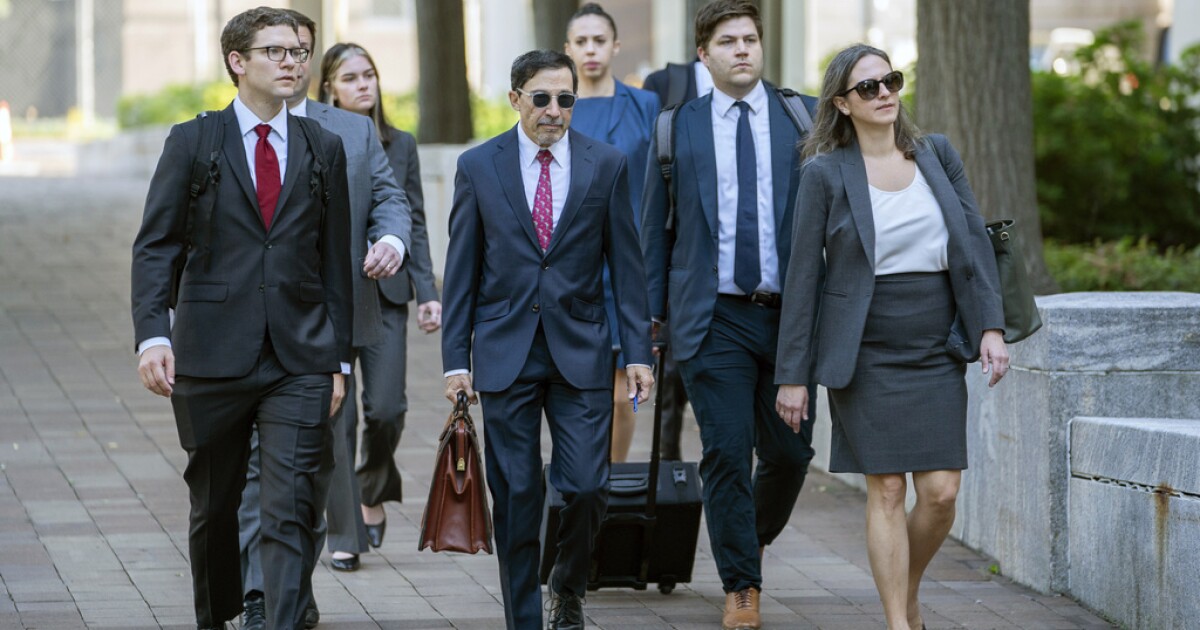

Google, the Department of Justice, and state attorneys squared off in federal court Tuesday in the biggest technology antitrust trial in years, debating whether the tech giant has unlawful market dominance in search.
The three parties appeared in court in Washington, D.C., to present their opening statements to District Judge Amit Mehta. The arguments are the beginning of a weekslong trial between the tech giant and the federal agency over allegations that Google had created a monopoly through its agreements with web browsers and phone makers to have Google as the default search engine.
APPLE IPHONE 15 LAUNCH: EVERYTHING YOU NEED TO KNOW AHEAD OF REVEAL EVENT
The DOJ’s case is “built on documents that capture exactly” what Google did to close off the ability of competitors like Apple to innovate and compete, DOJ prosecutor Kenneth Dintzer said in his opening remarks. For example, he posted a 2007 internal presentation in which a Google employee said that it would not share revenue with Apple if it did not place Google as the default search engine.
Dintzer also noted that, when Apple had its digital assistant Siri divert search inquiries for direct results, Google restricted it in order to ensure that its search engine was used. “Your honor, this is a monopolist flexing,” he said.
He also alleged that Google’s leadership, including CEO Sundar Pichai, explicitly attempted to hide internal communications by asking employees to allow their DMs to be deleted after 24 hours. “They turned history off, your honor, so they could rewrite it here in this courtroom,” Dintzer argued.
Google is not competing with Amazon, TikTok, and other tech giants, Dintzer argued, because TikTok, for example, can only provide limited information from within its websites. Google has access to the entirety of the internet and provides general outcomes, the prosecutor argued.
William Cavanaugh, who is the lawyer representing a group of states who also sued Google in 2020, argued that Google’s control of the advertising market allows it extensive control of advertising pricing. Cavanaugh argued that Google harmed Microsoft by temporarily withholding certain features from its advertising.
Finally, Google’s representative, John Schmidtlein, made the final set of opening remarks in an effort to challenge the DOJ. Schmidtlein argued that Microsoft installed Bing as the default search engine on the majority of its operating systems, but that users rely on Google because they prefer the product. That swap is evidence that Google’s market control is not due to the default agreements but due to user preference, he argued.
“Users today have more search options and more ways to access information online than ever before,” Schmidtlein argued. He also kept his focus on Microsoft, noting how Google was able to beat the software giant in search dominance through product quality. Mehta seemed to push back on Schmidtlein about whether he could prove that users usually swap browsers by default. Google’s lawyer was unable to present any substantial data due to the ability of users to easily swap back and forth.
Schmidtlein also argued that Google was competing in search not just with other search engines, but with other websites, such as Yelp and Amazon. He also noted that Google’s digital advertising tool did not oust others, but rather was competitive and empowered other companies where necessary.
CLICK HERE TO READ MORE FROM THE WASHINGTON EXAMINER
“Plaintiffs’ claims seek to distort search competition by hindering Google and its ability to compete,” Schmidtlein concluded. “All in the hopes that forcing people to use inferior products in the short run will somehow be good for competition in the long run.”
The DOJ’s suit was initially filed in partnership with 35 states in 2020, alleging that Google’s market dominance was hurting competitors. The trial is expected to last for several weeks this fall with the final decision not being released until next year.






